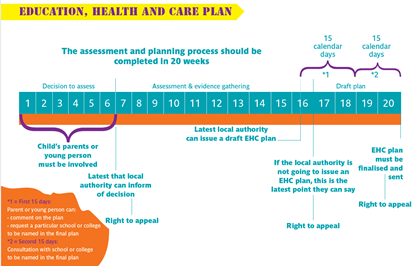
Permanent Exclusion
Permanent exclusion is the most serious sanction a school can give. It means that the child is no longer allowed to attend the school and their name will be removed from the school roll. Permanent exclusion should only be used as a last resort.
If your child has been permanently excluded, the local authority has a duty to provide suitable full-time alternative education from day 6. This is most likely to take place at a pupil referral unit or other alternative provision.
Unlawful suspensions
A suspension is unlawful/unofficial when schools do not formally record the process or do not follow legislation and guidance.
It is also unlawful for schools to extend or lengthen any formal suspension for a non-disciplinary reason such as:
- school saying it can’t meet a child’s needs. It should look at putting more or different support in place instead.
- because of something you have done as a parent.
- not allowing a child back into school after a fixed period suspension unless they meet particular conditions. Once the suspension is ended your child must be allowed to go back. For example, the head teacher can’t extend the suspension because your child won’t admit they are guilty.
Sending a child home to ‘cool off’ is unlawful, even if parents/carers agree.
All suspensions should be formally recorded.
Schools who unlawfully suspend children are not fulfilling their obligation to provide a full education for your child, You may be able to use suspension as evidence that your child needs more or different support in school.
Pupils can only be suspended/excluded for disciplinary reasons: not because a school cannot meet their needs.
Unlawful suspension/expulsion of a pupil with a disability may amount to disability discrimination under the Equality Act 2010.
Process to be followed when a suspension/exclusion is given
Step 1
When a head teacher suspends/excludes a pupil, they must without delay let parents know the type of suspension/exclusion and the reason(s) for it. They must also, without delay, provide parents with the following information in writing:
- the reason(s) for the suspension/exclusion;
- the length/type of the suspension/exclusion;
- the parents’ right to put forward their case about the suspension/exclusion to the governing board (appeal), how they should go about doing this and how the pupil can be involved; and when relevant
- what alternative provision will be provided from the sixth day of a fixed-period suspension.
Step 2
The head teacher should inform the governors/Local Authority of the suspension/exclusion if
- it is a permanent exclusion
- it is a suspension that would bring the pupil's total number of school days out of school to more than 15 in a term; or
- it would result in the pupil missing a public examination or national curriculum test.
The governing board must consider and decide on the reinstatement of a suspended or permanently excluded pupil within 15 school days of receiving notice of a suspension or permanent exclusion
The requirements are different for suspensions where a pupil would be suspended for more than five but less than 16 school days in a term. In this case, if the parents make representations, the governing board must consider and decide within 50 school days of receiving the notice of suspension
In the case of a suspension that does not bring the pupil's total number of days of suspension or permanent exclusion to more than five in a term, the governing board must consider any representations made by parents. There is also no deadline for this meeting to be arranged, however, if this does occur then it should happen within a reasonable amount of time
If the exclusion is permanent and if a parent does not agree with the governing bodies decision they can make a representation to the n independent reviewing panel, an application needs to be made within 15 school days of the notice being given to the parents by the governing board of its decision not to reinstate a permanently excluded pupil
Step 3
Schools should take reasonable steps to set and mark work for pupils during the first five days of a fixed-period exclusion.
For a suspension of more than five school days, the governing board (or local authority if the pupil is suspended from a Pupil Referal Unit) must arrange suitable full-time education for any pupil of compulsory school age.
For permanent exclusions, the local authority must arrange suitable full-time education for the pupil to begin from the sixth day, the duty is on the local authority for the area where the pupil lives
In addition, where a pupil has an EHCP, the local authority may need to review the plan or reassess the child’s needs, in consultation with parents, to identify a new placement
Note - For the first five school days of any exclusion, parents must ensure that their child of compulsory school age is not in a public place during school hours without very good reason. Parents must also ensure that their child attends any new full-time education
The following links provide additional further information:
 - Exclusion from School
- Exclusion from School
 School suspensions and permanent exclusions - GOV.UK (www.gov.uk)
School suspensions and permanent exclusions - GOV.UK (www.gov.uk)
 - Child Law Advice
- Child Law Advice












